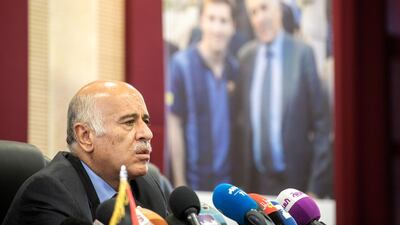Argentina’s national football team has prompted Palestinian celebration and Israeli ire after heeding the calls of activists by cancelling a controversial World Cup warm-up match against Israel in the contested city of Jerusalem.
Israel's embassy in Argentina confirmed the cancellation late Tuesday, as did Argentinian striker Gonzalo Higuain, who said “they’ve finally done the right thing”. The fixture was to be Argentina’s final match before the team travelled to the World Cup in Russia that begins on June 14, but it is now a major victory for the Boycott, Divestment and Sanctions (BDS) movement that seeks equal rights for Palestinians and an end to the Israeli occupation.
Palestinian politicians and activists had called on the Argentinian national team and its talisman, five-time Ballon D’or winner Lionel Messi, to scrap the match that Israel had reportedly paid $3 million (Dh11 million) to host after it was moved from the northern coastal city of Haifa to Jerusalem in an apparent political move.
Israeli Culture Minister Miri Regev reportedly sanctioned a $760,000 compensation payment for the move on the condition that she have a photo-op with Messi on the pitch.
____________
The National's World Cup Group D guide featuring Argentina
Theresa May tells Israeli PM of concern over Gaza clashes
____________
One of the most powerful calls in the boycott campaign came from 23-year-old Gazan footballer Mohammed Khalil, who was shot in both knees by Israeli forces while participating in the Great Return March to commemorate Land Day on March 30. He said that he was not posing a threat when he was shot. He called on Messi directly not to play in the game.
Speaking to The National after the news, he said that he was “very happy” about the decision.
“I’m grateful and thankful that my plea was heard and has made an impact on the Argentinian team’s decision to cancel the match,” he said.
“The Israeli occupiers portray us as terrorists, however, we are ordinary people and athletes, trying to have a normal life.”
The young footballer, whose career is likely over with him unable to leave Gaza for treatment, is now calling for Argentina to play a game with the Palestinian team.
“It would be an honour for us to have a friendly match with the Argentinian team on Palestinian grounds,” he said.
“They will be seen to be standing in solidarity with us.”
___________
Read more:
Rage at Israel's killing of unarmed Palestinians boils over in Gaza
US vetoes Kuwait UN proposal to protect Palestinians
___________
Palestinian Football Association chief Jibril Rajoub said the Palestinians would not have protested the match if it had remained in Haifa, but the Israeli government had “decided to make it political”.
Israeli leaders attempted to politicise the match by moving the venue of match to the city that they have long called its united and undivided capital.
But the Palestinians seek East Jerusalem, the territory that Israel occupied in the 1967 Arab-Israeli War, as the capital of any future state. Israel has built a network of settlements in the territory that hosts some of the holiest sites in Judaism and Islam.
Mr Rajoub thanked Argentina’s players, specifically Messi, for “refusing to be used to serve a non-sporting goal” in Jerusalem.
“Values, morals and sport have secured a victory today and a red card was raised at Israel through the cancellation of the game,” he said in a statement.
The Palestinian football chief had lobbied his Argentinian counterpart Claudio Tapia in a letter in which he said the match was to be played “in order to celebrate the ‘70th anniversary of the State of Israel.’”
Israel’s football association said he had crossed “every red line” and vowed to take revenge against the Palestinians at the international level, without specifying.
The sold-out match was to take place at Teddy Stadium in Jerusalem, home to Beitar Jerusalem, the ultranationalist team that has never signed an Arab player and whose fans have chanted against the Prophet Muhammad. The stadium is built on top of a destroyed Palestinian village, Al Malha.
The furore over the match again underscored how all aspects of Israeli and Palestinian society cannot escape the shadow of the decades-long conflict. The region’s most popular sport has been used as a political tool by both sides for years. Israel has used football to normalise relations with other countries, while the Palestinians have sought to have Israel banned from Fifa for violations in Jerusalem, the West Bank and Gaza.
Israeli politicians involved in the move tried to save face as opposition politicians and commentators clamoured to criticise their decision. Israeli Prime Minister Benjamin Netanyahu, who had called Argentinian President Mauricio Macri to intervene, said “we are moving on,” while others blamed the cancellation on threats against the Argentinian players. Israel’s Argentinian embassy said the cancellation was due to “threats and provocations” against Messi.
Israeli President Reuven Rivlin said there “are values that are greater than Messi”, while Israeli Defence Minister Avigdor Lieberman said Argentina had bowed to “Israel-hating inciters” and a “group of anti-Semites who support terror”, in an apparent reference to the BDS movement that Israel claims to campaign for the destruction of the country.
But others blamed the government. Isaac Herzog, chairman of Israel’s opposition Zionist Union party, called it a “spectacular own goal”. His number two Tzipi Livni called the cancellation a result of “(Culture Minister Miri) Regev and Netanyahu’s insistence on turning the game...into a display of personal politics”. Yair Lapid, leader of centrist Yesh Atid party, accused Netanyahu’s cabinet of “amateurism”.
Israeli commentators also turned on Ms Regev. "It has to be said very clearly: Argentina did not want this match to begin with but it would have come to play in Haifa. What Regev did with (the) forced transfer to Jerusalem was gross intervention, which was blatant, unnecessary and extremely damaging," wrote Haaretz sports commentator Uzi Dan.

